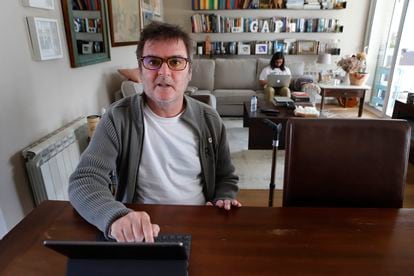The long-term effects of Covid-19: ‘I have mental lapses and I need help to walk’
Jordi Alba, a 55-year-old former advertising entrepreneur from Catalonia, is trying to get his life back after three months in intensive care during the first wave of the pandemic a year ago
/cloudfront-eu-central-1.images.arcpublishing.com/prisa/MVSTNWYUXFAZXKKJXEEYMJRLXA.JPG)

For several months during the darkest days of the coronavirus pandemic’s first wave, Jordi Alba fought for his life in an intensive care unit (ICU) in Barcelona’s Granollers Hospital. He was admitted in March 2020, and by the time he emerged, the world was a different place – and so was he.
Alba was one of the first people to get infected and even now, a year on, he is still suffering from the long-term effects caused by the disease and by his three months in intensive care. “I have mental lapses and I need help to walk,” says the 55-year-old. Before contracting the virus, Alba had been an advertising entrepreneur and a workaholic who traveled all over the world for business.
Within a short space of time, Alba’s world and that of his family took a 180-degree turn. His wife Adriana Payà, 50, helps Alba, who is still convalescing, to tell his story. “It was all very fast,” she says. “On March 11, 2020, he told me he was coming down with the flu. Two days later he couldn’t breathe and he was admitted to Sant Celoni Hospital. On March 21 he was taken to the ICU at Granollers Hospital. He was in a very serious condition and we didn’t speak again for the next three months.”
He was a workaholic, and now he has trouble reading two sentences in a rowAdriana Payá, Jordi Alba's wife
Every day was agony for Alba’s family: the daily call from the hospital would bring bad news, then better news, then worse news again. “They woke him up after a month in the ICU,” she says, unable to hold back her tears. “I was allowed to see him then, but when I was putting on my personal protective equipment to go in, all the doctors disappeared. I figured one of the patients had taken a turn for the worse and they had to take care of this person. After a while, a doctor came and told me it was Jordi. He had relapsed.”
Alba beat Covid-19 after three months in the ICU, but the virus took a massive toll. When he woke up, he couldn’t move his head or eat; he could barely articulate. “It was as if he were a quadriplegic,” says Payá. During his time in the ICU, he also suffered a stroke triggered by the virus and had associated cognitive impairment. “It affected his reasoning,” says Payá. “He still has memory lapses and he has a hard time reading or doing mental calculations.”
Emerging from the ICU was not easy either, as Alba recalls; there were masks everywhere, regulated visits and security protocols. The family told him bit by bit what had happened in the outside world during those months and what had happened at home as well: they had to tell him that his father had died of Covid-19 when he was in the ICU. “It all seemed a bit like a horror movie to me,” he says.

When he left the hospital, Alba was referred to the Institut Guttmann for neurorehabilitation and spent another three months in an individualized cognitive, respiratory and motor rehabilitation program. After he was discharged in September, he continued to receive outpatient care two hours a day, three times a week, until a few days ago. “I would have liked him to have stayed longer, but Guttmann is a specialized center focusing on the most severe cases,” says Payá. “Now we are in limbo, doing a lot of paperwork to see what resources they assign him. Jordi still needs someone to guide him, he needs help because he can hardly do anything by himself.”
As the doctors explained to the couple, the first six months are key to recovering from brain damage. After a year, what has not been recovered is lost, or regained very slowly. “Jordi has finished rehabilitation, but now he needs more so that he doesn’t lose what he has gained,” says Payá. “He was a workaholic and now he has trouble reading two sentences in a row. He lacks concentration and is tired and apathetic because of the brain damage. I don’t know how long he will need rehabilitation.”
Alba is already walking with the help of a cane and a splint. In the absence of further rehabilitation resources in the public health system, the family has also turned to private specialists. “Since he was discharged, I have been taking him to the osteopath and he has also had acupuncture,” says Payá. “It costs me €80 per session. It would be good for him to go to the osteopath every week, but I don’t know how we are going to manage financially because he can’t work.”
Alba also says that he misses rehabilitation, although he hates doing the cognitive exercises, which are part of an electronic program designed by Guttmann involving memory tasks, puzzles and other activities. “A simple addition or subtraction is horribly hard for me,” he says.
English version by Heather Galloway.
/cloudfront-eu-central-1.images.arcpublishing.com/prisa/GCC3AGJNXBGORE7JCFCWFU2UOY.jpg)
/cloudfront-eu-central-1.images.arcpublishing.com/prisa/6QPEW3FL22LKLPVPIVAQQI7I5A.JPG)










































